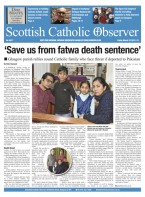January 27 | ![]() 0 COMMENTS
0 COMMENTS ![]() print
print

Holy Father praises the work of women in society and the Church
Pope Francis has called for more women to participate in the life of the Church.
The Pope was speaking at the national conference of the Centro Italiano Femminile (CIF)—the Italian Women’s Centre—on Saturday where he praised women who shared ‘some pastoral responsibilities with priests in accompanying people, families, and groups… more spaces are widened for a feminine presence in the Church.’
The Pope hoped that this presence would recognise women’s skills in public life, and he also emphasised ‘the irreplaceable role of women in the family.’
“[They] represent not only a genuine strength for the lives of families, but a reality without which the vocation human would not be able to be realised,” the Pope added.
During the speech to the CIF national conference, the Pope described how their ‘feminine genius’ was being recognised within working lives but worried about the extent to which this compromised their family lives.
The Holy Father then asked the audience: “At this point the question arises: How you can grow in the effective presence of many areas of the public sphere, in the world of work and in places where the most important decisions are adopted, and at the same time maintain a presence and preferential attention and everything unique in and for the family?”
The Pope then answered his own question by encouraging the delegates to reflect on the ‘reality of women in society’ through prayer and perseverance, and turn to Mary as an example.
“She, who cares for her divine Son, has gained his first miracle at the wedding at Cana, she who was also present on Calvary and at Pentecost, indicates to us the way to go to better understand the meaning and role of women in society and to be totally faithful to the Lord Jesus and to your mission in the world.”
The Italian Women’s Centre is a close equivalent to the Union of Catholic Mothers network at work here in Scotland. It was set up in 1944 in order to promote civic and social issues with a particular Catholic perspective when Italian women first received the vote following the end of the Second World War.










